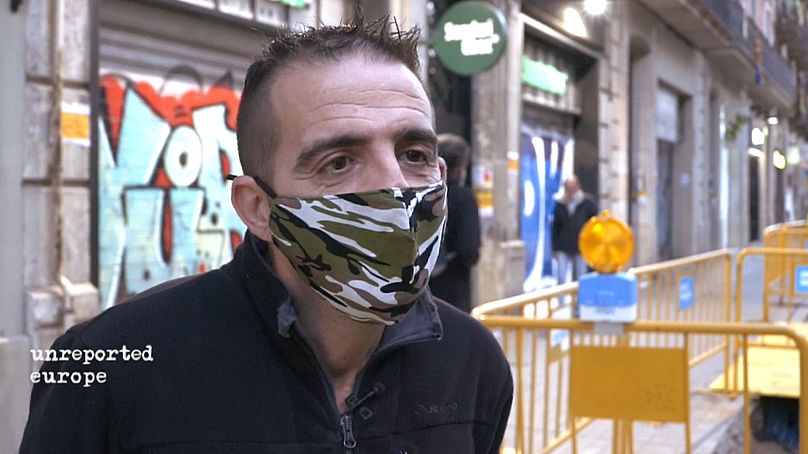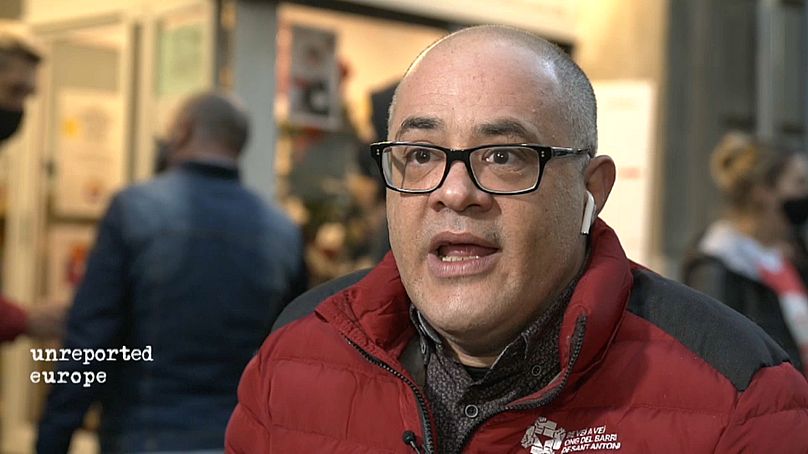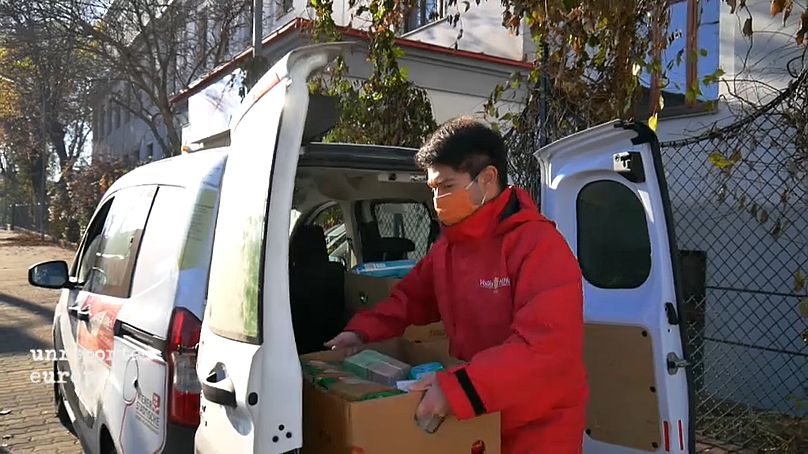In this edition of Unreported Europe, we look at how Spain and Austria have been affected by the 'new poverty' created by the pandemic. We speak to people whose lives have been turned upside by the virus.
Barcelona is a city known for its architecture, culture and thriving business sector.
But the city has recently revealed a darker side: people from all walks of life are suddenly finding themselves exposed to hardship and occasionally hunger.
The economic crisis caused by the pandemic is wreaking havoc, especially among the middle classes. Nearly half the people asking for social and financial help now are called the “new poor”. They’re people who, for the first time, are in a position of vulnerability. We met with one such family that has lost everything.
Antonio and Cristina have three children. COVID-19 destroyed their small tapas bar, their income. Unable to pay the bills, they also lost their flat. In order to eat, the family has had to ask for help. The association 'From neighbour to neighbour' collects food from local shops and gives it to people in need. For Antonio, it’s was a first. He told us how it felt:
“I never imagined myself in this position.
"Otherwise, why would I have had three children?
"I was doing fine.
"My life just took a turn for the worse.
"Honestly, going and asking for food at first makes you feel ashamed.”
In September, when the family lost their home, the city council gave them a comfortable tourist flat as a temporary shelter. They are allowed to stay in it until the summer.
Toni’s wife, Cristina, is from Romania. She believes there are a lot of ‘new poor’ in Spain. She also shares Antonio's embarrassment of using charities to survive, but sees no other option:
"It's very hard seeing yourself there, but it’s something you have to do, you have to eat, there is no other option.
"Thanks to these associations, thanks to the fact they exist, we get help.
"Without such support, you would have to look through rubbish bins or steal."
Antonio and his family never considered themselves wealthy, but they always managed to make ends meet. But now, with the 400 euros they get monthly from social security, and Antonio unable to claim unemployment benefits, even buying ice cream for their children is impossible.
On the daily walk to pick up their children from school, there's a constant reminder of the family's bleak situation. Antonio's former tapas bar is just a few steps away. His memories of having to sell the place are still painful:
“I made this place my own, to my own taste, how could that not hurt?
"It's something that you create, something you make your own and it went wrong.
"That hurts."
Charities helping the hungry
Oxfam believes that COVID-19 could raise the number of people living in poverty in Spain by around 1.1 million. But why is Spain being hit so hard? Rafael Martínez Buñuel, the president of the association “From neighbor to neighbor” gave us some answers:
“Somehow we ignored the importance of the “informal economy”.
"Now we understand that a lot of people used to work in the “informal economy”, which now no longer exists.
"As it’s an invisible economy, it’s an invisible poverty or wealth."
Before the pandemic, his association delivered 2.5 tons of food per month, serving around 130 to 140 people. In the past 8 months, their deliveries have increased to over 100 tons.
New poverty caused by the pandemic is hitting countries all over Europe. Austria is no exception. Vienna, the capital is known for its wealth and well-being. But just like Barcelona, this city has a hidden side. Almost out of the blue some people have been left without work and exposed to hardships, including hunger. Food stocked on the shelves of Non-profit NGOs is disappearing quickly.
The coronavirus has shattered lives in the European Union’s sixth-richest country. Many who were once in a comfortable situation, have now found themselves on the streets.
One such person is Regina. She’s a German national who has worked in hotels all around Europe, cooking, cleaning, helping and serving. Until the summer she was in Spain. But when she got a winter job offer in Austria, she accepted. When she arrived, her job was no more. Regina tells Euronews what happened before she and her two dogs were saved by a homeless shelter.
She first rented a cheap room in a boarding house and stayed there for four weeks. But her money quickly ran out and she and her dogs started to get hungry. That was when she went to the homeless shelter. She may be off the street, but she still hasn't found a long term solution:
"I’ve never been in a situation like this.
"You cannot move forward, you cannot go back.
"I’m a bit jittery because I am sick with worry: What will happen to me?”
Sharing a hot meal with the homeless is a new experience for Regina. She asked for unemployment benefits, but the Austrian administration realised she lacks 127 days of work to be entitled to this. It’s difficult for the system to understand and count her days worked abroad.
Pandemic induced “New poverty” has also come down hard on single parents, the self-employed, small business owners, and seasonal workers, the list goes on and on.
Tanja Wehsely, the director of the NGO, Volkshilfe Wien, described the situation to us:
“The corona crisis is like a magnifying glass showing the fine fractures in society.
"We have around 70 percent more people coming to us, asking for urgent help, for food parcels."
_The Tourism Industry _
Tourism counts for over seven percent of Austria's GDP and usually, it's an industry that lacks personnel. But COVID-19 has put hotel managers in a difficult situation too. The lockdown has forced most hotels to close.
Regina went in person to hand over her 48th job application form to, Michaela Reitterer, the president of the Austrian Hotel Association. Reitterer explained that the COVID-19 crisis turned to tragedy for the tourist industry in the country when Germany issued its travel warning. She says her colleagues are reluctant to hire because they don't know what the future holds.
The good news for Regina is that Reitterer has promised to help her find a job in Austria.
The European Union is helping the vulnerable in this pandemic. 13.5 billion euros of the Cohesion Policy Funds have already been given to those who need it. More money is also in the pipeline. Across the board, from people to associations to governments, Europeans are showing they can fight this crisis.













